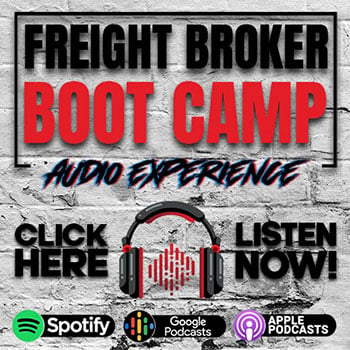The concept of freight broker certification is sometimes confusing to those interested in pursuing a career in domestic freight brokering.
Me included when I first got started back in 2003. So this post will differentiate facts from fiction. Specifically at it relates freight broker certification and what is needed in order to become a freight broker.
Do You Have to be Certified to Operate A Freight Brokerage Business?
Answer: No! There is no certification, test or exam required in order to own or run a freight brokerage operation.
But the Federal Motor Carrier Safety Administration (FMCSA) requires all freight brokers to have a US freight broker license/authority.
Requirements to get your freight broker license/authority:
- Completion of FMCSA freight broker application
- BOC-3 (Designation of Process Agent)
- Freight Broker Surety Bond / Trust
- Unified Carrier Registration (UCR)
- High school diploma or GED
In addition the FMCSA requirements, getting trained as a freight broker or freight agent is probably a good idea.
The primary role of a freight broker is to serve as middleman between shippers and carriers. Their focus is on coordinating their clients shipments from point A to point B.
One of their main job duties is to source and vet motor carriers, to ensure they are in full compliance with all FMCSA regulations.
They may also help with scheduling pickup and delivery appoints and dispatching drivers. A brokers job also involves trouble shooting any issue that might delay or damage the freight during transit.
The main skills of an effective freight broker include: sales, negotiating, multi tasking, attention to detail. problem solving and time management.
Do Freight Agents Need to Be Certified to Operate in the Transportation Industry?
Answer: No! They are NOT required to be “certified” or to pass any test or exam in order to work under a licensed broker. Freight agents work under a licensed freight broker.
A freight agents, also know as freight broker agent, is typically a 1099 independent contractor that operate similar to an independent salesperson.
Freight agents are typically paid between 50-70% commission based upon the profit from any of their customer loads.
Most people who decide to become a freight broker or freight agent will attend either an online freight broker training or possibly an onsite training at a local university. Although this training is optional it is strongly suggested in order to fully understand the day-to-day operations.
Freight broker courses vary in their formate and cost. Most good programs focus on teaching the core fundamentals of the shipping industry. Including: 1) How to become a freight broker or agent. 2) What steps and skills are necessary to effectively operate as a freight broker.
Don’t Be Fooled!
There is no such thing as a certified freight broker!
In some freight broker and freight agent training schools they use the word(s) “certified”, “certification” or as a part of their marketing.
Don’t be fooled by their marketing efforts. The FMCSA does not require any form of certification or exam in order to become a licensed freight broker or freight agent.
If you are planning on becoming a freight agent, a certificate of completion could potentially be useful for a freight brokerage that is considering hiring you as an agent. A certificate could be proof that you did attend and/or pass the freight agent training program.
So don’t be fooled into paying more for your freight broker course or training by fancy certification gimmicks like “Master Broker” or “Journeyman Broker”.
The fact of the matter is, while training and experience matter, we are all just freight brokers as defined by the FMCSA, nothing more, nothing less!
P.S. To get full access to my self paced, online freight broker training course just visit www.freighrbrokerbootcamp.com




I would like more information
January 8, 2018 at 5:14 amMore info please
January 1, 2019 at 8:38 pmNO there is no certification to become a broker or an agent.
January 2, 2019 at 1:51 pmI would like to know if you have freight broker courses
May 7, 2025 at 11:26 pmYes we have trained over 10,000 students. http://www.FreightBrokerBootCamp.com 60 day 100% money back guarantee!
June 13, 2025 at 9:26 amYes of course just go to http://www.freightbrokerbootcamp.com
June 24, 2025 at 11:17 am